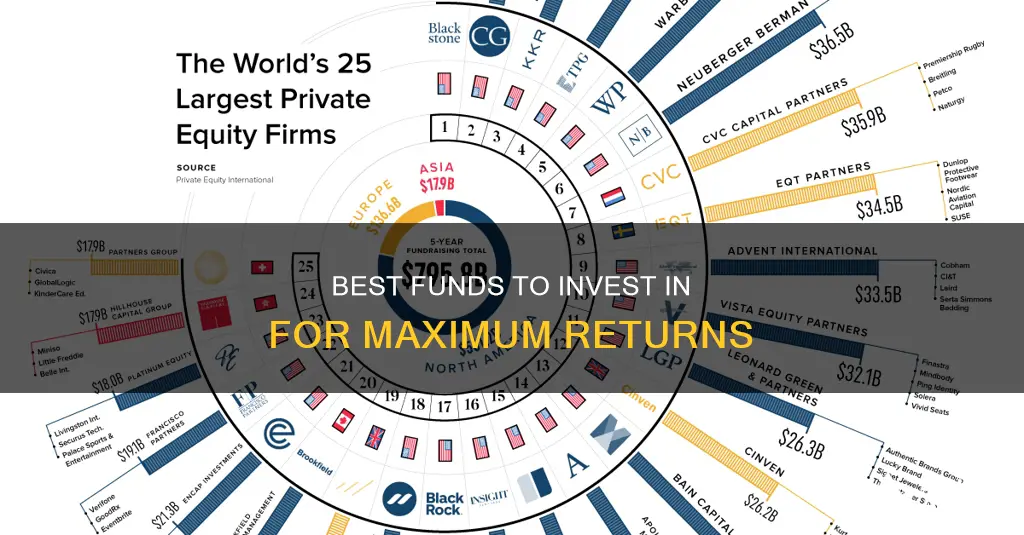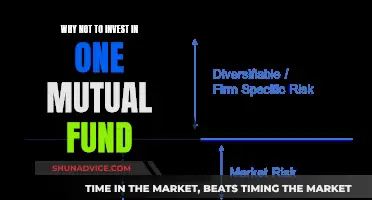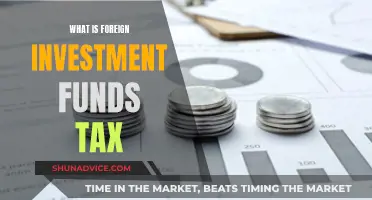
There are many options for investors looking to grow their money, from relatively safe choices like high-yield savings accounts and money market funds to medium-risk options like corporate bonds and riskier picks like individual stocks.
For those looking to invest in funds, mutual funds and exchange-traded funds (ETFs) are good options. Mutual funds pool money from many participants to buy a portfolio of stocks, bonds and other securities. ETFs are similar, but they trade on an exchange like stocks. Both mutual funds and ETFs can be actively or passively managed. Actively managed funds have higher expense ratios because fund managers curate the fund's holdings, while passively managed funds, like index funds, aim to match the performance of an underlying index.
- Fidelity International Index Fund (FSPSX): This fund has outperformed its Morningstar peer group over the past one, three, five and 10 years. It owns mid- and large-cap companies from 21 international markets.
- Fidelity U.S. Sustainability Index Fund (FITLX): This fund gives investors a low-cost way to invest in members of the MSCI USA ESG Select Index, which screens for environmental, social and governance factors. It has outperformed its Morningstar large-cap blend category average over the past one, three and five years.
- Schwab S&P 500 Index Fund (SWPPX): This fund gives shareholders exposure to most of the 500 largest U.S. companies for a low fee. It has a 10-year average annual return of above 12%.
- Shelton Nasdaq-100 Index Fund Investor (NASDX): This fund outperformed 98% of its Morningstar category over the past decade. About 80% of the fund is in the fast-growing technology, communication services and consumer cyclical sectors.
- Schwab Fundamental US Large Company Index Fund (SFLNX): This fund invests in stocks based on what Schwab calls fundamental measures, such as sales, cash flow and dividends. It's a contrarian, value-oriented fund that shines during brief periods of outperformance.
- Fidelity Intermediate Municipal Income Fund (FLTMX): This fund focuses on bonds with a dollar-weighted average maturity between three and 10 years. About 90% of its bonds are rated A or better, minimising default risk.
- Dodge & Cox Income Fund (DODIX): This actively managed bond fund has endured for more than 35 years, turning over roughly 55% of its holdings annually. It has a slightly better-than-average expense ratio of 0.41%.
- Vanguard Long-Term Investment-Grade Fund Investor Shares (VWESX): This fund owns approximately 1,300 bonds, with about 80% in long-term corporate bonds. More than 90% of the bonds are A-rated or better.
- Schwab Fundamental US Small Company Index (SFSNX): This fund weights its holdings based on sales, cash flow and dividends, tending to be value-oriented. It beat its Morningstar category averages over the past one, three, five and 10 years.
- T. Rowe Price Mid-Cap Growth Fund (RPMGX): This fund has beaten its mid-cap growth category's returns over the past three, 10 and 15 years. Morningstar classifies it as lower risk with higher returns than its category average.
Other top funds to invest in as of 2024 include:
- Vanguard S&P 500 ETF (VOO): This fund invests in all 500 companies that make up the S&P 500 large-cap benchmark index. It has a low expense ratio of 0.03%.
- Vanguard High Dividend Yield ETF (VYM): This fund tracks an index of stocks with above-average dividend yields. It has a 0.06% expense ratio and invests in 556 different stocks.
- Vanguard Real Estate ETF (VNQ): This fund targets stable REITs, offering dividends and slight S&P outperformance. It has a dividend yield of about 4.2% and a low expense ratio of 0.12%.
- iShares Core S&P Total U.S. Stock Market ETF (ITOT): This fund aims to match the performance of the overall U.S. stock market. It owns almost 2,500 stocks, ranging from mega-cap giants to small-cap companies, and has a very low expense ratio of 0.03%.
- Consumer Staples Select Sector SPDR Fund (XLP): This fund invests in consumer staples companies in the S&P 500 index. It has a low expense ratio of 0.09%.
- iShares 0-3 Month Treasury Bond ETF (SGOV): This fund invests in Treasury securities with maturity dates of three months or less. It's a safe investment with a yield of about 5.3% as of mid-2024.
- Vanguard Utilities ETF (VPU): This fund tracks the utility sector, which includes recession-resistant businesses like electric and gas companies. It has a low expense ratio of 0.10% and a dividend yield of about 3% as of June 2024.
- iShares U.S. Healthcare Providers ETF (IHF): This fund focuses on healthcare providers, diagnostics and health insurance. It has a higher expense ratio of 0.40%, but that's typical for a specialised ETF.
- Schwab U.S. TIPS ETF (SCHP): This fund invests in inflation-protected Treasury securities. It had a trailing 12-month yield of around 3.1% as of June 2024. It has a low expense ratio of 0.03%.
| Characteristics | Values |
|---|---|
| Type | High-yield savings accounts, Long-term certificates of deposit, Long-term corporate bond funds, Dividend stock funds, Value stock funds, Small-cap stock funds, REIT index funds, S&P 500 index funds, Nasdaq-100 index funds, Rental housing, Mutual funds, Index funds, Growth funds, Value funds, Tech-stocks, Large-growth funds, Large-blend funds, Money market mutual funds, Corporate bonds, Government bonds, Stock funds, Exchange-traded funds |
| Performance | Fidelity Blue Chip Growth ETF FBCG up 57.2% in 2023, Invesco Small Cap Value SMVSX up 20.8% in 2023, Baron Focused Growth BFGUX up 25.3% in 2023, Fidelity Growth Company FGCKX up 22.2% in 2023 |
| Risk | Lower risk: High-yield savings accounts, Long-term certificates of deposit, Long-term corporate bond funds, Dividend stock funds, Value stock funds, Small-cap stock funds, REIT index funds, S&P 500 index funds, Nasdaq-100 index funds, Mutual funds, Index funds, Money market mutual funds, Government bonds, Corporate bonds, Stock funds, Exchange-traded funds |
| Risk | Higher risk: Rental housing, Tech-stocks |

Top mutual funds
When looking for the top mutual funds to invest in, it's important to consider your risk tolerance, investment objectives, and time horizon. Here are some of the top mutual funds to consider, based on their performance, low fees, and positive reviews from financial publications:
Fidelity International Index Fund (FSPSX)
Fidelity has been a trusted mutual fund provider for decades and is known for its low fees. The FSPSX fund owns mid- and large-cap companies from 21 international markets, offering diversification outside of the US and Canadian markets. It has consistently outperformed its Morningstar peer group in the past one, three, five, and ten years. The fund has a low expense ratio, and its dividend yield is higher than the category average.
Fidelity U.S. Sustainability Index Fund (FITLX)
The FITLX fund offers investors a low-cost way to invest in companies that meet environmental, social, and governance (ESG) criteria. It includes well-known companies such as Microsoft, Nvidia, Alphabet, and Tesla. The fund has outperformed its Morningstar large-cap blend category average in the past one, three, and five years, making it a strong choice for investors who want to incorporate ESG factors into their investment decisions.
Schwab S&P 500 Index Fund (SWPPX)
This fund provides investors with exposure to most of the 500 largest US companies at a very low fee. It has a diverse portfolio, and its 10-year average annual return of over 12% beats its Morningstar category's average. Additionally, the fund has a zero minimum initial investment requirement, making it accessible to a wide range of investors.
Shelton Nasdaq-100 Index Fund Investor (NASDX)
The Shelton Nasdaq-100 Index Fund has been a top performer over the past decade, outscoring 98% of its Morningstar category. It focuses on the fast-growing technology, communication services, and consumer cyclical sectors. While the fund has a relatively high P/E ratio, it is still lower than the average of its Morningstar category.
T. Rowe Price Mid-Cap Growth Fund (RPMGX)
The T. Rowe Price Mid-Cap Growth Fund is managed by Brian Berghuis and has a strong track record, outperforming its mid-cap growth category's returns over the past three, ten, and fifteen years. It has a low annual turnover rate of around 21%, making it a relatively conservative growth offering. Morningstar classifies it as lower risk with higher returns than its category average.
Fidelity 500 Index Fund (FXAIX)
The Fidelity 500 Index Fund tracks the S&P 500 index and has been in operation since 1998. It has no minimum required investment, sales loads, or transaction fees, making it highly accessible to investors. The fund has a very low expense ratio, and its long track record and massive assets under management make it a stable choice.
Vanguard 500 Index Fund Admiral Shares (VFIAX)
The Vanguard 500 Index Fund Admiral Shares is one of the most well-known index funds, passively tracking the S&P 500 index. It has a massive assets under management and a low expense ratio. However, it does have a minimum investment requirement.
These mutual funds offer a range of options for investors with different risk tolerances and investment objectives. Remember to consider your financial goals and conduct thorough research before investing in any mutual fund.
Funding Circle: Safe Investment or Risky Business?
You may want to see also

Top index funds
Index funds are a passive investment that tracks an index, aiming to replicate its performance. They are a great investment for building wealth over the long term and are popular with retirement investors. Here are some of the top index funds to consider:
Vanguard S&P 500 ETF (VOO)
The Vanguard S&P 500 ETF is one of the largest index funds globally and is backed by Vanguard, a powerhouse in the fund industry. It has an expense ratio of 0.03%, meaning every $10,000 invested would cost $3 annually. The fund has delivered a 5-year annualized return of 16.0%.
SPDR S&P 500 ETF Trust (SPY)
The SPDR S&P 500 ETF is one of the oldest ETFs, dating back to 1993. It is among the most popular ETFs, with hundreds of billions in the fund. The expense ratio is 0.095%, translating to $9.50 for every $10,000 invested annually. The 5-year annualized return is 15.9%.
IShares Core S&P 500 ETF (IVV)
The iShares Core S&P 500 ETF is sponsored by BlackRock, one of the largest fund companies. It has been tracking the S&P 500 closely since its inception in 2000. The expense ratio is 0.03%, resulting in a cost of $3 for every $10,000 invested annually. The fund has delivered a 5-year annualized return of 16.0%.
Schwab S&P 500 Index Fund (SWPPX)
The Schwab S&P 500 Index Fund is sponsored by Charles Schwab, a well-respected name in the industry. It has tens of billions in assets and a strong record dating back to 1997. The fund stands out for its low expense ratio of 0.02%, resulting in a cost of $2 for every $10,000 invested annually. The 5-year annualized return is 16.0%.
Vanguard Russell 2000 ETF (VTWO)
The Vanguard Russell 2000 ETF tracks the Russell 2000 Index, comprising about 2,000 of the smallest publicly traded companies in the U.S. As a Vanguard fund, it prioritizes keeping costs low for investors, with an expense ratio of 0.10%. That equates to a cost of $10 for every $10,000 invested annually. The 5-year annualized return is 9.4%.
Vanguard Total Stock Market ETF (VTI)
The Vanguard Total Stock Market ETF covers the entire universe of publicly traded stocks in the U.S., including small, medium, and large companies across all sectors. Being a Vanguard fund, it maintains low costs, with an expense ratio of 0.03%, or $3 for every $10,000 invested annually. The 5-year annualized return is 15.2%.
Best Vanguard Funds: Where to Invest Smartly
You may want to see also

Top stocks
When it comes to investing in stocks, there are a few key considerations to keep in mind. Firstly, it's important to assess your risk tolerance and investment goals. Are you comfortable with higher-risk investments that offer greater potential returns, or do you prefer more conservative options? Are you investing for retirement, or do you have shorter-term financial goals in mind?
With that in mind, here are some of the top stock picks for 2024:
Exchange-Traded Funds (ETFs)
ETFs are a popular investment choice as they offer diversification and the ability to invest in a wide range of asset classes. ETFs can be traded like stocks, and you can purchase them for the price of a single share or less, making them accessible to investors with a small amount of capital. Some examples of ETFs to consider include:
- Vanguard S&P 500 ETF (VOO)
- SPDR S&P 500 ETF Trust (SPY)
- IShares Core S&P 500 ETF (IVV)
- Invesco QQQ Trust ETF (QQQ)
- Vanguard Russell 2000 ETF (VTWO)
- Vanguard Total Stock Market ETF (VTI)
Dividend Stocks
Dividend stocks tend to weather market storms better than growth stocks, making them a good choice for uncertain economic times. A group of more than 60 companies, known as the Dividend Aristocrats, have increased their dividends for at least 25 consecutive years. You can invest in individual companies within this group or opt for an ETF like the ProShares S&P 500 Dividend Aristocrats ETF (NOBL).
Real Estate Investment Trusts (REITs)
REITs are a good way to invest in commercial real estate without the hassle of property management. They offer high dividend yields and potential capital appreciation. One of the best options is RealtyMogul, a crowdfunding platform for buying and selling commercial real estate.
Mutual Funds
Mutual funds pool money from multiple investors to purchase a diverse range of stocks, bonds, and other securities. They are typically affordable and professionally managed, making them a good choice for those who want a hands-off approach to investing. Some top mutual funds to consider include:
- Fidelity International Index Fund (FSPSX)
- Vanguard S&P 500 ETF (VOO)
- Shelton Nasdaq-100 Index Fund Investor (NASDX)
- Dodge & Cox Income Fund (DODIX)
- Vanguard Long-Term Investment-Grade Fund Investor Shares (VWESX)
Sector-Specific Funds
If you want to focus on specific sectors or industries, there are funds that cater to that. For example, the Consumer Staples Select Sector SPDR Fund (XLP) invests in companies that sell essential goods, while the Vanguard Utilities ETF (VPU) focuses on utility companies.
Remember, it's always important to do your own research and consult with a financial advisor before making any investment decisions.
Appaloosa Hedge Fund: A Guide to Investing Wisely
You may want to see also

Top investment trusts
When considering investment trusts, it's important to remember that past performance is not an indicator of future results. With that in mind, here are some of the top-performing investment trusts:
JPMorgan China Growth & Income Ord
This trust had the best performance over the last month, according to data from Morningstar. However, it was the worst performer in Morningstar's coverage in 2023, falling just over 37% in share price terms.
Fidelity China Special Ord
This trust was the second-best performer over the last month.
Baillie Gifford China Growth Trust Ord
This trust was the third-best performer over the last month.
Chrysalis Investments Limited Ord
This trust was the fourth-best performer over the last month. It also had a 10% share price return in 2023, despite some turbulence in the property sector.
Life Science REIT Ord
This trust was the fifth-best performer over the last month.
SLF Realisation Fund Ord
This trust was the sixth-best performer over the last month.
Menhaden Resource Efficiency Ord
This trust was the seventh-best performer over the last month.
Golden Prospect Precious Metal Ord
This trust was the eighth-best performer over the last month. It was also the fourth-best performer over the last three years.
Balanced Commercial Property Ord
This trust was the ninth-best performer over the last month. It was also the fifth-best performer over the last three years.
Pershing Square Holdings Ord
This trust was the tenth-best performer over the last seven years.
JPMorgan American Ord
This trust was the best performer over the last year, with a near 25% share price gain. It was also the only trust in the 34-strong list to belong to the US Equity Large Cap Growth category.
Henderson European Focus Trust (HEFT)
This trust was the second-best performer over the last year.
Scottish Mortgage (SMT)
This trust was the third-best performer over the last year. It is also one of the largest trusts in the market, with a valuation of over £10 billion.
TR Property (TRY)
This trust was an outlier in 2023, producing a share price return of 10% despite turbulence in the property sector.
Pacific Assets (PAC)
This trust gained 8% in 2023.
Schroder Asian Total Return (ATR)
This trust rose 6.8% in 2023, even as Asian equities struggled.
Digital 9 Infrastructure plc (DGI9)
This trust invests in digital infrastructure such as fibre systems, data centres, and wireless networks. While it has struggled since its launch in early 2021, it currently offers an attractive dividend yield of 10%.
Downing Renewables & Infrastructure Trust Plc (DORE)
This trust invests in a portfolio of hydro, solar, wind, and other infrastructure assets across the UK and Europe. It has a current dividend yield of 6%.
Finsbury Growth & Income Trust plc (FGT)
This trust, launched in 1926, invests primarily in larger-cap UK companies. It has a dividend yield of just over 2% and is trading on a relatively modest discount.
Merchants Trust plc (MRCH)
This trust, launched in 1889, focuses on investing in large and mid-cap UK companies. It has a healthy dividend yield of 5% and charges one of the lowest annual fees.
Pacific Assets Trust plc (PAC)
This trust, launched in 1985, invests in sustainable companies across the Asia Pacific region and the Indian subcontinent (excluding Japan, Australia, and New Zealand). It has a modest dividend yield of less than 1% and is likely to appeal to investors looking for capital growth.
The Renewables Infrastructure Group Limited (TRIG)
This trust, launched in 2013, invests in a portfolio of renewable energy infrastructure projects across the UK and Europe, primarily in offshore and onshore wind projects. It has delivered one of the highest returns by net asset value and has a current dividend yield of 6.8%.
Seraphim Space Investment Trust plc (SSIT)
This trust, launched in 2021, invests in early-stage space technology companies with a global remit. It is one of the more speculative and higher-risk investments and is currently trading at a discount of more than 60%.
Medallion Hedge Fund: A Guide to Investing Wisely
You may want to see also

Top sector funds
When considering the top sector funds to invest in, it's important to assess your risk tolerance, timeline, knowledge of investing, financial situation, and investment amount. Here are some top sector funds to consider:
Vanguard S&P 500 ETF (VOO)
The Vanguard S&P 500 ETF is one of the largest funds in the market, with hundreds of billions in assets. It began trading in 2010 and is backed by Vanguard, a powerhouse in the fund industry. With an expense ratio of 0.03%, it's a cost-effective option for investors. The fund's five-year annualized return was 16.0%, making it a solid choice for those seeking a broadly diversified index fund.
SPDR S&P 500 ETF Trust (SPY)
The SPDR S&P 500 ETF is one of the oldest ETFs, founded in 1993. It is among the most popular ETFs, with hundreds of billions in assets. Sponsored by State Street Global Advisors, it tracks the S&P 500 index. The expense ratio is 0.095%, and the five-year annualized return is 15.9%. This fund is a good option for investors seeking a broadly diversified index fund.
IShares Core S&P 500 ETF (IVV)
The iShares Core S&P 500 ETF is sponsored by BlackRock, one of the largest fund companies. This ETF has been around since 2000 and has a strong track record of closely following the S&P 500 index. With an expense ratio of 0.03% and a five-year annualized return of 16.0%, it's a cost-effective option for investors.
Schwab S&P 500 Index Fund (SWPPX)
The Schwab S&P 500 Index Fund is sponsored by Charles Schwab, a well-respected name in the industry. This mutual fund has been around since 1997 and has tens of billions in assets. It has an impressive five-year annualized return of 16.0% and a low expense ratio of 0.02%. This fund is ideal for investors seeking a broadly diversified index fund with a strong track record.
Vanguard Russell 2000 ETF (VTWO)
The Vanguard Russell 2000 ETF tracks the Russell 2000 Index, which consists of about 2,000 small publicly traded companies in the US. This ETF started trading in 2010 and is known for its low costs, as is typical of Vanguard funds. With an expense ratio of 0.10% and a five-year annualized return of 9.4%, it's a good option for investors seeking broad exposure to small-cap companies.
Vanguard Total Stock Market ETF (VTI)
The Vanguard Total Stock Market ETF provides broad diversification across the market capital spectrum. It includes small, medium, and large companies across all sectors. This ETF has been around since 2001 and, with Vanguard as the sponsor, offers low costs. The expense ratio is 0.03%, and the five-year annualized return is 15.2%. This fund is ideal for investors seeking broad diversification and low costs.
Travel Fund Investment Accounts: Pros and Cons
You may want to see also







